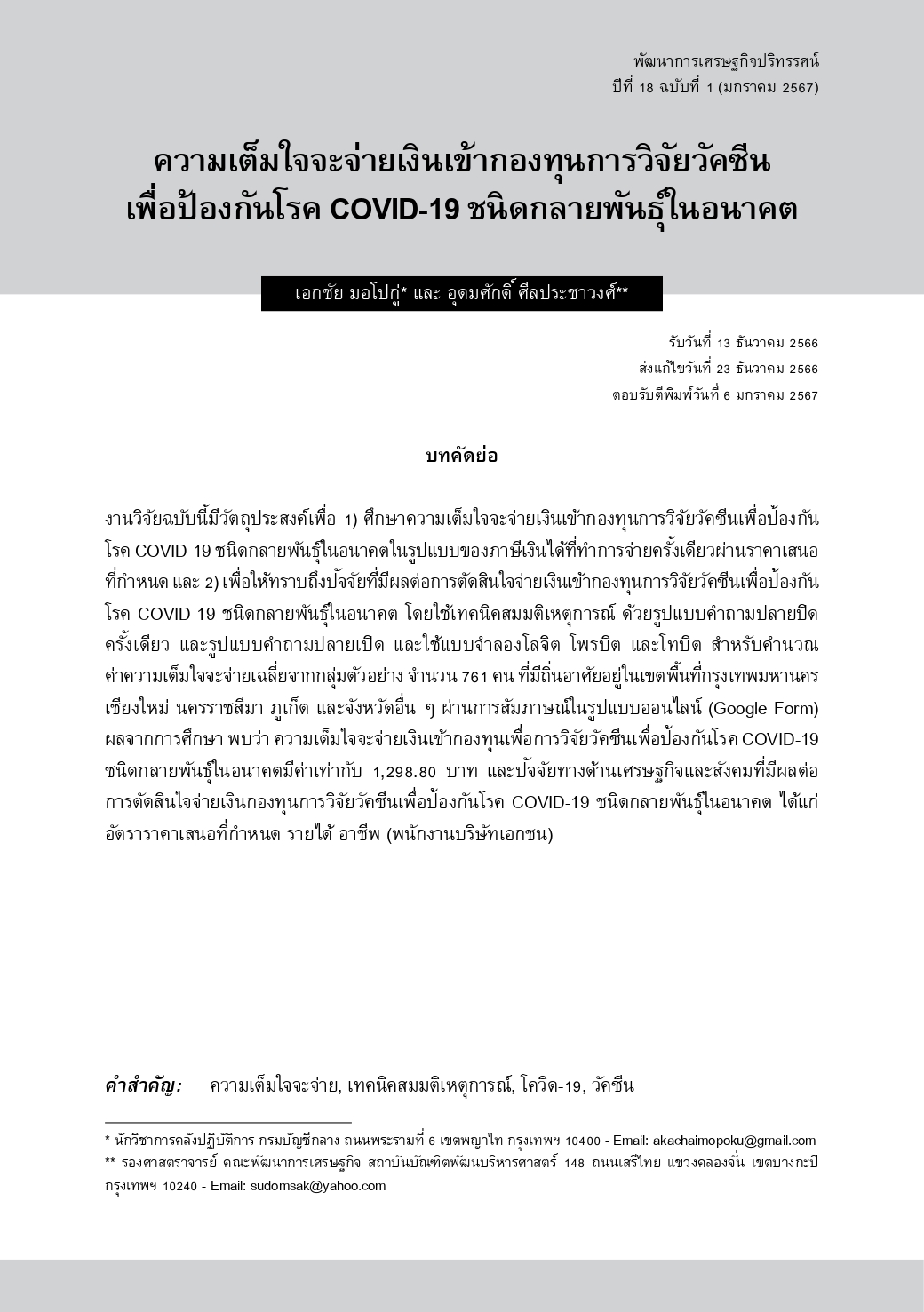ความเต็มใจจะจ่ายเงินเข้ากองทุนการวิจัยวัคซีนเพื่อป้องกันโรค COVID-19 ชนิดกลายพันธุ์ในอนาคต
คำสำคัญ:
ความเต็มใจจะจ่าย, โควิด, วัคซีนบทคัดย่อ
งานวิจัยฉบับนี้มีวัตถุประสงค์เพื่อ 1) ศึกษาความเต็มใจจะจ่ายเงินเข้ากองทุนการวิจัยวัคซีนเพื่อป้องกันโรค COVID-19 ชนิดกลายพันธุ์ในอนาคตในรูปแบบของภาษีเงินได้ที่ทำการจ่ายครั้งเดียวผ่านราคาเสนอที่กำหนด และ 2) เพื่อให้ทราบถึงปัจจัยที่มีผลต่อการตัดสินใจจ่ายเงินเข้ากองทุนการวิจัยวัคซีนเพื่อป้องกันโรค COVID-19 ชนิดกลายพันธุ์ในอนาคต โดยใช้เทคนิคสมมติเหตุการณ์ ด้วยรูปแบบคำถามปลายปิดครั้งเดียว และรูปแบบคำถามปลายเปิด และใช้แบบจำลองโลจิต โพรบิต และโทบิต สำหรับคำนวณค่าความเต็มใจจะจ่ายเฉลี่ยจากกลุ่มตัวอย่าง จำนวน 761 คน ที่มีถิ่นอาศัยอยู่ในเขตพื้นที่กรุงเทพมหานคร เชียงใหม่ นครราชสีมา ภูเก็ต และจังหวัดอื่น ๆ ผ่านการสัมภาษณ์ในรูปแบบออนไลน์ (google form)
ผลจากการศึกษา พบว่า ความเต็มใจจะจ่ายเงินเข้ากองทุนเพื่อการวิจัยวัคซีนเพื่อป้องกันโรค COVID-19 ชนิดกลายพันธุ์ในอนาคตมีค่าเท่ากับ 1,298.80 บาท และปัจจัยทางด้านเศรษฐกิจและสังคมที่มีผลต่อการตัดสินใจจ่ายเงินกองทุนการวิจัยวัคซีนเพื่อป้องกันโรค COVID-19 ชนิดกลายพันธุ์ในอนาคต ได้แก่ อัตราราคาเสนอที่กำหนด รายได้ อาชีพ (พนักงานบริษัทเอกชน)
เอกสารอ้างอิง
Khon Seyhak, (2020). THE PUBLIC DEMAND FOR A DENGUE FEVER VACCINE: A CONTINGENT VALUATION SURVEY IN PHNOM PENH, CAMBODIA. (Master of Economic), National Institute of Development Administration, Bangkok
Worldometers. (2021). COVID-19 CORONAVIRUS PANDEMIC. Retrieved from https:// www.worldometers.info/coronavirus/ (October 31, 2021)
World Health Organization. (2021). Coronavirus disease (COVID-19) questions and answers (general). Retrieved from https://www.who.int/thailand/emergencies/novel-coronavirus-2019/q-a-on-COVID-19/q-a-on-COVID-19-general (January 20, 2022)
World Health Organization. (2021). Coronavirus disease (COVID-19) questions and answers on vaccine. Retrieved from https://www.who.int/thailand/emergencies/novel-coronavirus-2019/q-a-on-COVID-19/q-a-on-COVID-19-vaccines (October 23, 2021)
World Health Organization. (2021). Tracking SARS-CoV-2 variants. Retrieved from https://www.who.int/en/activities/tracking-SARS-CoV-2-variants/ (January 20, 2022)
กรมควบคุมโรค. (2564). แนวทางปฏิบัติเพื่อการป้องกันโรคติดเชื้อไวรัสโคโรนา 2019 (COVID-19) หรือ
โควิด 19 สำหรับประชาชนทั่วไปและกลุ่มเสี่ยง. จาก https://ddc.moph.go.th/viralpneumonia/file/int_protection/int_protection_030164.pdf (31 ตุลาคม 2564)
กรมควบคุมโรค. (2564). สถานการณ์โรคติดเชื้อไวรัสโคโรนา 2019 (COVID-19) มาตรการสาธารณสุข และปัญหาอุปสรรคการป้องกันควบคุมโรคในผู้เดินทาง. จาก https://ddc.moph.go.th/uploads/files/2017420210820025238.pdf (31 ตุลาคม 2564)
ชลทิศ อุไรฤกษ์กุล. (2564). การกลายพันธุ์ของ SAR-COV-2 ที่เป็นสาเหตุของโรค COVID-19. จาก http://doh.hpc.go.th/bs/issueDisplay.php?id=589&category=B10&issue=CoronaVirus2019 (8 ธันวาคม 2564)
สำนักงานสภาพัฒนาการเศรษฐกิจและสังคมแห่งชาติ (2561). ผลิตภัณฑ์ภาคและจังหวัดแบบปริมาณลูกโซ่ ฉบับ พ.ศ. 2561.จาก https://www.nesdc.go.th/ewt_dl_link.php? nid=5628&filename=gross_regional (20 มกราคม 2565)
อธิราช ทวีปฏิมากร และอุดมศักดิ์ ศีลประชาวงศ์ (2561). ความเต็มใจจะจ่ายค่าบริการน้ำประปาเพื่ออนุรักษ์และฟื้นฟูป่าต้นน้ำ. พัฒนาการเศรษฐกิจปริทรรศน์ปีที่ 12 ฉบับที่ 1 (มกราคม 2561)
อุดมศักดิ์ ศีลประชาวงศ์. (2561). การประเมินมูลค่าทางเศรษฐศาสตร์ของทรัพยากรสิ่งแวดล้อม.
(พิมพ์ครั้งที่ 2).กรุงเทพมหานคร: พี.เอ.ลีฟวิ่ง

ดาวน์โหลด
เผยแพร่แล้ว
ฉบับ
ประเภทบทความ
สัญญาอนุญาต
Copyright to published manuscripts becomes the property of the Graduate School of Development Economics, National Institute of Development Administration. Reproduction of all or part of a Development Economic Review (DER) article by anyone, excluding author(s), is prohibited, unless receiving our permission.

